Five Herbal Topical Psoriasis Treatments
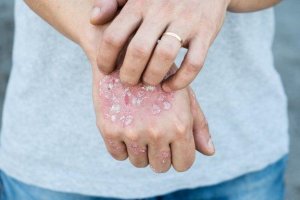
Herbal topical psoriasis treatments have attracted the attention of many patients who are struggling with its symptoms. This condition requires professional care. However, these natural alternatives may relieve the symptoms.
Psoriasis is an autoimmune condition that compromises skin health. It’s estimated that it affects 2% of the population. In many cases, it manifests simultaneously with the condition known as psoriatic arthritis.
Oral medications and light therapy are some modern ways of coping with its symptoms. However, more research is still needed to find evidence on the benefits of plants.
What is Psoriasis?
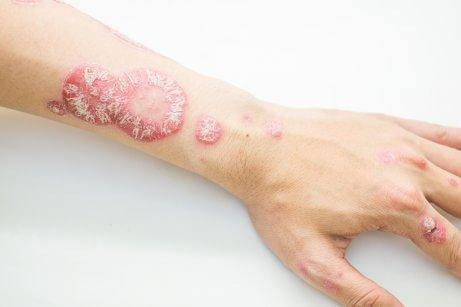
Psoriasis is a chronic disease. It causes the rapid accumulation of skin cells. This, in turn, produces reddened spots or scabs that may be accompanied by pain, cracking, or bleeding, among other symptoms.
Overall, there are several forms of the disease. These include psoriatic arthritis, plaque psoriasis, and guttate psoriasis. There are also pustular, inverse, and erythrodermic psoriasis, the latter being one of the most serious and rare forms.
Symptoms of Psoriasis
The clinical manifestations of psoriasis can vary from person to person depending on the type and evolution of the disease. The affected areas are often the scalp, hands, elbow, and neck.
In these areas, the following can develop:
- Red and swollen patches
- Peeling or whitish scabs
- Dry and cracked skin that may bleed
- Pain around the affected areas
- Itching and burning
- Thick nails with gaps
- Tender and swollen joints.
We recommend that you read: Therapies and Medications to Treat Psoriasis
Five Herbal Topical Psoriasis Treatments
Herbal topical psoriasis treatments can help reduce the inflammation and flaking caused by the disease. In fact, many herbal extracts are used to prepare drug products for the same purpose.
Discover them here!
1. Aloe Vera
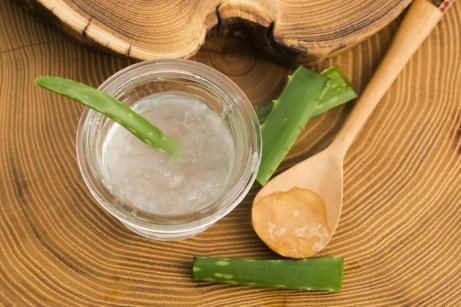
Aloe vera gel has soothing properties that reduce psoriasis discomfort.
Undoubtedly, aloe vera is one of the most popular herbal topical psoriasis treatments. Due to its soothing, antibacterial and refreshing properties, it’s an effective option to minimize irritation, pain, and redness. In fact, it promotes the prevention of infections.
How to Use It
- Ideally, apply aloe vera gel topically three times a week for three to four weeks.
- If the symptoms persist, rest for a week and then resume.
2. Turmeric
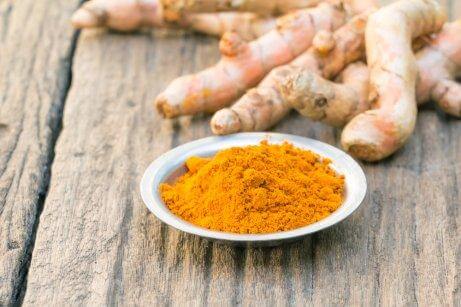
Turmeric is an anti-inflammatory spice that belongs to the same family as ginger.
Its active compound, curcumin, has yielded positive results in the treatment of psoriasis. Thanks to its antibacterial and calming effect, it reduces the risk of infections and soothes burning.
How to Use It
- You can reap its benefits through topical gels or preparations. A good option is to mix turmeric powder with honey.
- You can use this remedy for three to four straight weeks.
This article may interest you: Combat Psoriasis With These Natural Remedies
3. Oregon Grapes

Oregon grapes (Mahonia aquifolium) have anti-inflammatory properties that make them stand out as an herbal topical psoriasis treatment.
These properties may reduce rashes and redness.
How to Use it
- You can grind this plant to obtain a powdered extract. Then, you can add it to a moisturizing cream.
- In addition, you can also use its distilled extracts.
4. Common Marigold
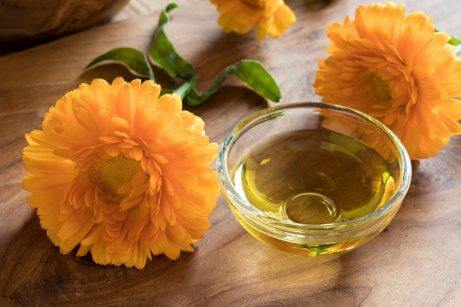
Peeling and itching can be reduced by topically applying common marigold.
Common marigold is an anti-inflammatory plant with many skin health benefits. For hundreds of years, it has been used in the treatment of skin diseases as it helps relieve symptoms such as swelling, redness, and peeling.
How to Use it
- Taking baths with the infusion of this plant may help relieve psoriasis.
- In addition, you can also use its extracts in creams or oils.
5. Chamomile
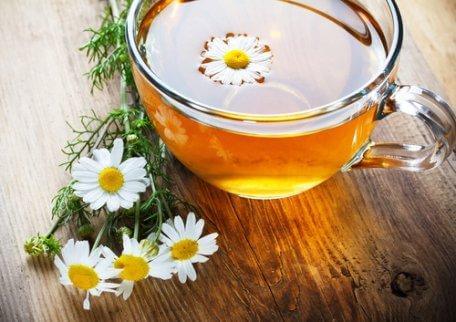
It’s no secret that chamomile has been used dermatologically for many years.
Chamomile has anti-inflammatory and soothing properties. Therefore, it’s an ideal treatment for the symptoms of psoriasis, eczema, and other skin disorders.
How to Use it
- Its infusion can be applied topically as a lotion. You can also use its extracts and oils to prepare creams.
- Ideally, apply the plant two or three times a day.
Are you afflicted by the symptoms of psoriasis? In addition to seeing your doctor, don’t hesitate to try these herbal topical psoriasis treatments. However, in case of any adverse effects, stop using these remedies immediately.
All cited sources were thoroughly reviewed by our team to ensure their quality, reliability, currency, and validity. The bibliography of this article was considered reliable and of academic or scientific accuracy.
- Herman, A., & Herman, A. P. (2016). Topically used herbal products for the treatment of psoriasis – Mechanism of action, drug delivery, clinical studies. Planta Medica. https://doi.org/10.1055/s-0042-115177
- Mukherjee, P. K., Nema, N. K., Maity, N., Mukherjee, K., & Harwansh, R. K. (2013). Phytochemical and Therapeutic Profile of Aloe vera. Journal of Natural Remedies. https://doi.org/10.18311/JNR/2014/84
- Feily, A., & Namazi, M. R. (2009). Aloe vera in dermatology: a brief review. Giornale Italiano Di Dermatologia e Venereologia : Organo Ufficiale, Società Italiana Di Dermatologia e Sifilografia.
- Shishodia, S. (2013). Molecular mechanisms of curcumin action: Gene expression. BioFactors. https://doi.org/10.1002/biof.1041
- Thangapazham, R. L., Sharma, A., & Maheshwari, R. K. (2007). Beneficial role of curcumin in skin diseases. Advances in Experimental Medicine and Biology. https://doi.org/10.1007/978-0-387-46401-5_15
- Gulliver, W. P., & Donsky, H. J. (2005). A report on three recent clinical trials using Mahonia aquifolium 10% topical cream and a review of the worldwide clinical experience with Mahonia aquifolium for the treatment of plaque psoriasis. American Journal of Therapeutics. https://doi.org/10.1097/01.mjt.0000174350.82270.da
- Akhtar, N., Zaman, S. U., Khan, B. A., Amir, M. N., & Ebrahimzadeh, M. A. (2011). Calendula extract: Effects on mechanical parameters of human skin. Acta Poloniae Pharmaceutica – Drug Research.
- Matricaria chamomilla (German chamomile). (2008). Alternative Medicine Review. https://doi.org/10.1177/0081175015581379
This text is provided for informational purposes only and does not replace consultation with a professional. If in doubt, consult your specialist.








